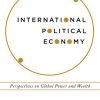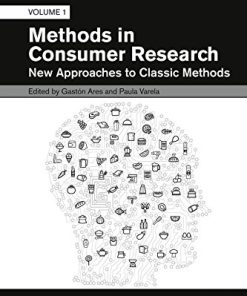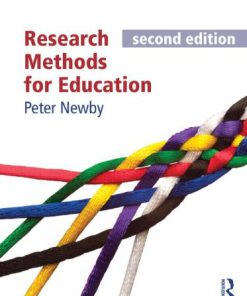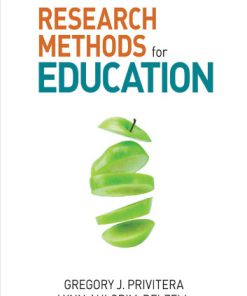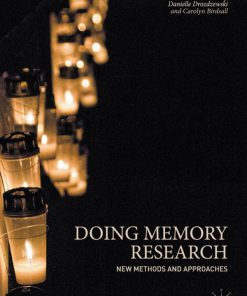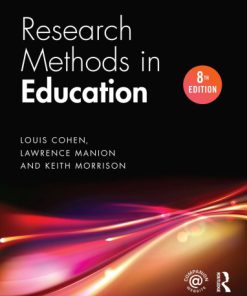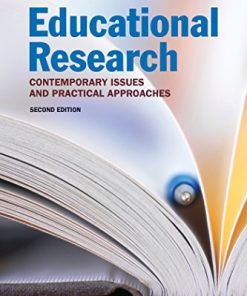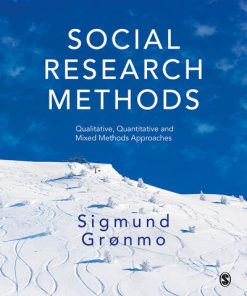Comparative Education Research Approaches and Methods 2nd Edition by Mark Bray ISBN 9783319055947 3319055941
$50.00 Original price was: $50.00.$25.00Current price is: $25.00.
Comparative Education Research Approaches and Methods 2nd Edition by Mark Bray – Ebook PDF Instant Download/Delivery: 9783319055947 ,3319055941
Full download Comparative Education Research Approaches and Methods 2nd Edition after payment
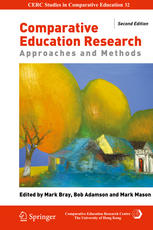
Product details:
ISBN 10: 3319055941
ISBN 13: 9783319055947
Author: Mark Bray
Comparative Education Research Approaches and Methods 2nd Edition Table of contents:
I: Directions
1 Actors and Purposes in Comparative Education
Different Actors, Different Purposes
Policy Makers and Comparative Education
International Agencies and Comparative Education
UNESCO
The World Bank
The OECD
Academics and Comparative Education
Conclusions
References
2 Scholarly Enquiry and the Field of Comparative Education
Defining Tribes and Mapping Territories
Education, and Comparative Education, in Relation to Other Domains of Enquiry
Methodology and Focus in Comparative Education
Geomorphic Shifts
Conclusions
References
3 Quantitative and Qualitative Approaches to Comparative Education
Quantitative and Qualitative Research Methods in Education
Quantitative Approaches
Qualitative Approaches
Considerations for Comparative Education
Quantitative and Qualitative Research on Literacy
How can Literacy be Accurately Defined and Depicted?
Where do Variations in Literacy Lie?
What Leads to Literacy?
What are the Consequences of Literacy?
Conclusions
References
II: Units of Comparison
4 Comparing Places
General Approaches and Tools for Comparative Education Analyses
The Bray and Thomas Framework for Comparative Education Analyses
Geographic Entities as Units of Analysis
Level 1: World Regions/Continents
Level 2: Countries
Level 3: States/Provinces
Level 4: Districts
Level 5: Schools
Level 6: Classrooms
Level 7: Individuals
Comparison across Levels
Conclusions: Methodological Issues in Comparing Places
References
5 Comparing Systems
Familiar Approaches but Loose Usages
Defining and Identifying Education Systems
Why Compare Systems?
A Set of Examples: China
The Education Systems of Hong Kong
The Education Systems of Macao
Another Set of Examples: United Kingdom
Conclusions
References
6 Comparing Times
Time
Historical Approaches to Comparative Education
Histories of Education
Prevailing Forms of Histories of Education
Prevailing Theoretical Perspectives
Characteristics of Modern Historical Analysis
Strategies for Comparing Times
Units of Comparison
Structures for Comparing Times
Problems when Comparing Times
Problems of Sources
Problems of Interpretation
Problems of Periodisation
Conclusions
References
7 Comparing Race, Class and Gender
Race
Race and Ethnicity: Fluid Conceptions
Race, Ethnicity, and Comparative Education Research
Class
What is Class?
Class and Comparative Education Research
Gender
Final Thoughts on Race, Class and Gender
References
8 Comparing Cultures
Defining and Describing Cultures
A genealogy of culture
‘National culture’ in modern societies
‘National culture’ in an increasingly globalised world
Comparing Education across Cultures
Methodological approaches to comparing education across cultures
Conclusion: Values and Interests in Comparing Education across Cultures
References
9 Comparing Values
Category A: Size, Scale and Complexity of the Research Construct
Case One: Large Scale, Multiple Researchers, and Multiple Dimensions and Instruments – The Interna
Case Two: Small Scale, Multiple Researchers, and Simple Instruments – A Study of Teachers’ Perce
Case Three: Large Scale, Single Researcher, Multiple Dimensions and Instruments – A Study of Polit
Case Four: Small Scale, Multiple Researchers and Secondary Quantitative Analysis – A Study of Stud
Category B: Longitudinal Studies of Textbooks
Case Five: Multiple Countries, One Researcher, Quantitative – A Longitudinal Analysis of 465 Textb
Case Six: One Country, Mixed Methods – A Longitudinal Analysis of Civic Education Textbooks
Category C: Studies of Convergent and Divergent Values
Case Seven: Studying Convergent Values – A Delphi Study on Policy Shapers in Nine Countries
Case Eight: Studying Divergent Values – A Sigma Study of Leaders in 11 Countries
Case Nine: Studying Divergence in Convergent Values – Asian Civic Values Study
Category D: Comparing Cases in Qualitative Studies
Case 10: A Study of School Cases in Six Societies
Case 11: Secondary Qualitative Case Analyses
Discussion and Conclusions
References
10 Comparing Policies
The Changing International Policy Environment
Understanding Policy: Two Perspectives
The Rational Perspective
The Conflict Perspective
Making Sense of Comparing Education Policy: Uses and Abuses
The All-important Context
The continuing dominance of Anglo-American scholarship
Divides in the policy literature
Under-estimated Cultural Factors
Conclusion
References
11 Comparing Curricula
The Nature of Curriculum
Approaching Comparisons of Curricula
Purpose and perspective
Evaluative perspective
Interpretive perspective
Critical perspective
Curriculum focus and manifestations
Research Methods in Comparing Curricula
Evaluative study
Interpretive study
Critical study
Conclusions
References
12 Comparing Pedagogical Innovations
Research on Educational Change, Reform and Innovation
Methods for Comparing Pedagogical Practices
Video-Studies of Teaching as Surveys of Instructional Practice
Linking Pedagogy with Schooland System-Level Characterisations
Revealing Diversity in Pedagogy and its Relationship with School Factors
International Comparisons of Pedagogical Innovations
SITES M2—Characterizing Classroom and School Level Typologies of ICT-enabled Pedagogical Innovatio
Research context and questions
Definition and selection of innovation cases
Methodological approach, research design and instrumentation
Analytical methods and key outcomes
Contributions and limitations of the study
SCALE CCR—Comparing Vastly Different Grain Sizes of Innovation “Cases” from Asia and Europe to
Research context and questions
Definition and selection of innovation cases
Methodological approach, research design and instrumentation
Analytical methods and key outcomes
Contributions and limitations of the study
ITL—Investigating Conditions for ICT Use to Foster Students’ 21st Century Skills from an Ecosyst
Research context and questions
Definition and selection of innovation cases
Methodological approach, research design and instrumentation
Analytical methods and key outcomes
Contributions and limitations of the study
Methodological Advances and Challenges to Comparing Pedagogy and Pedagogical Innovations
Limited Utility of Static, Decontextualised Comparisons of Pedagogy
From Contextual Mapping to Ecosystem Modelling
Building dynamic ecosystem models of pedagogical innovation
Looking ahead
References
13 Comparing Ways of Learning
Learning Approaches
Comparing Correlates of Learning Strategies
Conceptual equivalence
Reliability
Within-construct validity
The cross-cultural meta-analysis
The Paradox of the Asian Learner
Conceptions of Teaching: A Chinese Perspective
Conclusions
References
14 Comparing Educational Achievements
Why Compare Achievements?
What are the Procedures for Measuring Achievements?
How is the subject matter defined?
What kinds of summary scores are needed?
What is the blueprint like?
What kinds of items are used?
Who writes and checks the items?
How are the items translated?
How are the items trialled?
How do the final tests look?
Whom to Compare?
Age versus grade groups
Defined population
Comparing Levels and Equity of Performance
Pupils within schools
Levels of school performance
Levels of regional performance
Important information at the national level
How equitable is achievement among schools?
Conclusions
References
III: Conclusions
15 Different Models, Different Emphases, Different Insights
Models for Comparative Education Research
The number of units for comparison
Revisiting the Bray and Thomas cube
Epistemological approaches
Emphases in Comparative Education Research
Enduring Threads
References
ERRATUM
Contributors
Index
People also search for Comparative Education Research Approaches and Methods 2nd Edition:
comparative research examples in education
comparative and international research in education
examples of comparative education
types of comparative education
Tags:
Mark Bray,Comparative,Education Research,Approaches,Methods
You may also like…
Biology and other natural sciences - Plants: Agriculture and Forestry
Education Studies & Teaching - School Education & Teaching
Research Methods for Education 2nd Edition by Peter Newby ISBN 9780415735858 0415735858
Education Studies & Teaching - School Education & Teaching
Education Studies & Teaching
Politics & Philosophy - Government & Politics
Politics & Philosophy - Social Sciences
Education Studies & Teaching
Educational Research Contemporary Issues and Practical Approaches 2nd Edition Jerry Wellington


